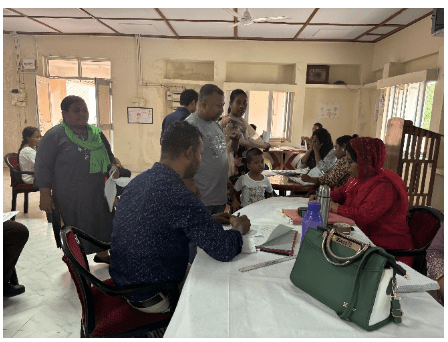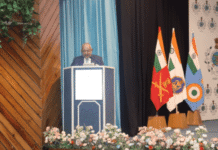A medical assessment camp was conducted at the BJR Hospital Conference Hall in Car Nicobar to identify and support children with special needs under the Inclusive Education component of Samagra Shiksha. Organized by the Block Project Officer (BPO), the camp brought together schoolchildren, Anganwadi attendees, and parents in an effort to screen for developmental and learning disabilities.
The event, held on August 3, saw the participation of 40 children – 13 of whom were already registered as Children with Special Needs (CwSN), while 23 others were suspected to have disabilities based on observations from schools. Four children from Anganwadi centres also attended the camp, along with their parents, caregivers, and Anganwadi workers.
A team of specialists conducted the assessments. Dr. Sahina (SMO), Dr. Ruth (Dentist), and Pradeep Singh (Ophthalmic Assistant) from BJR Hospital, Car Nicobar, collaborated with an expert from the Artificial Limbs Manufacturing Corporation of India (ALIMCO), who joined via virtual mode. Together, they conducted physical, dental, visual, and general developmental assessments to evaluate the children’s needs.
The primary goal of the camp was to enable early diagnosis, timely intervention, and planning of individual support services for children with physical, sensory, or cognitive challenges. Each child underwent a detailed examination based on their suspected area of disability, with findings recorded for future referrals and interventions.
The involvement of parents and community stakeholders in the event marked an important step toward strengthening inclusive education in the region. Their participation underlined the growing awareness around the need for early detection of developmental issues and the importance of appropriate follow-up support to ensure affected children are not left behind in the education system.
While the camp was primarily a diagnostic event, it also served an important awareness function. Health and education professionals engaged with parents and caregivers to educate them about the significance of regular checkups, home-based therapies, and the process of accessing institutional support through government schemes and departments.
The initiative forms part of a wider push to bring inclusive education practices to the Nicobar Islands, where geographical isolation and limited access to specialized services often act as barriers for children with disabilities. By identifying suspected cases early, the administration aims to reduce long-term academic and social disadvantages.
The programme also reinforces the core objectives of Samagra Shiksha, which include equitable and inclusive education across all districts, especially in tribal and remote island areas. Bringing medical assessments into the education planning process ensures that children who need assistive technologies, special educators, or therapy services are identified and supported at an early stage.
The camp’s success also demonstrated the potential of tele-expert collaborations, like the virtual participation of ALIMCO, in extending specialist services to remote areas. Such hybrid models are increasingly being viewed as cost-effective and scalable ways to address gaps in healthcare and education infrastructure on the islands.
The BPO, Car Nicobar, is expected to follow up on the findings by coordinating with relevant departments to arrange assistive devices, referrals, and inclusive learning plans for the children assessed. The outcomes of the camp will also feed into the planning for future interventions in other schools and Anganwadi centres.
By building cross-sectoral linkages between health and education, this initiative offers a blueprint for improving the well-being and academic prospects of children with special needs in geographically disadvantaged regions like Car Nicobar.





